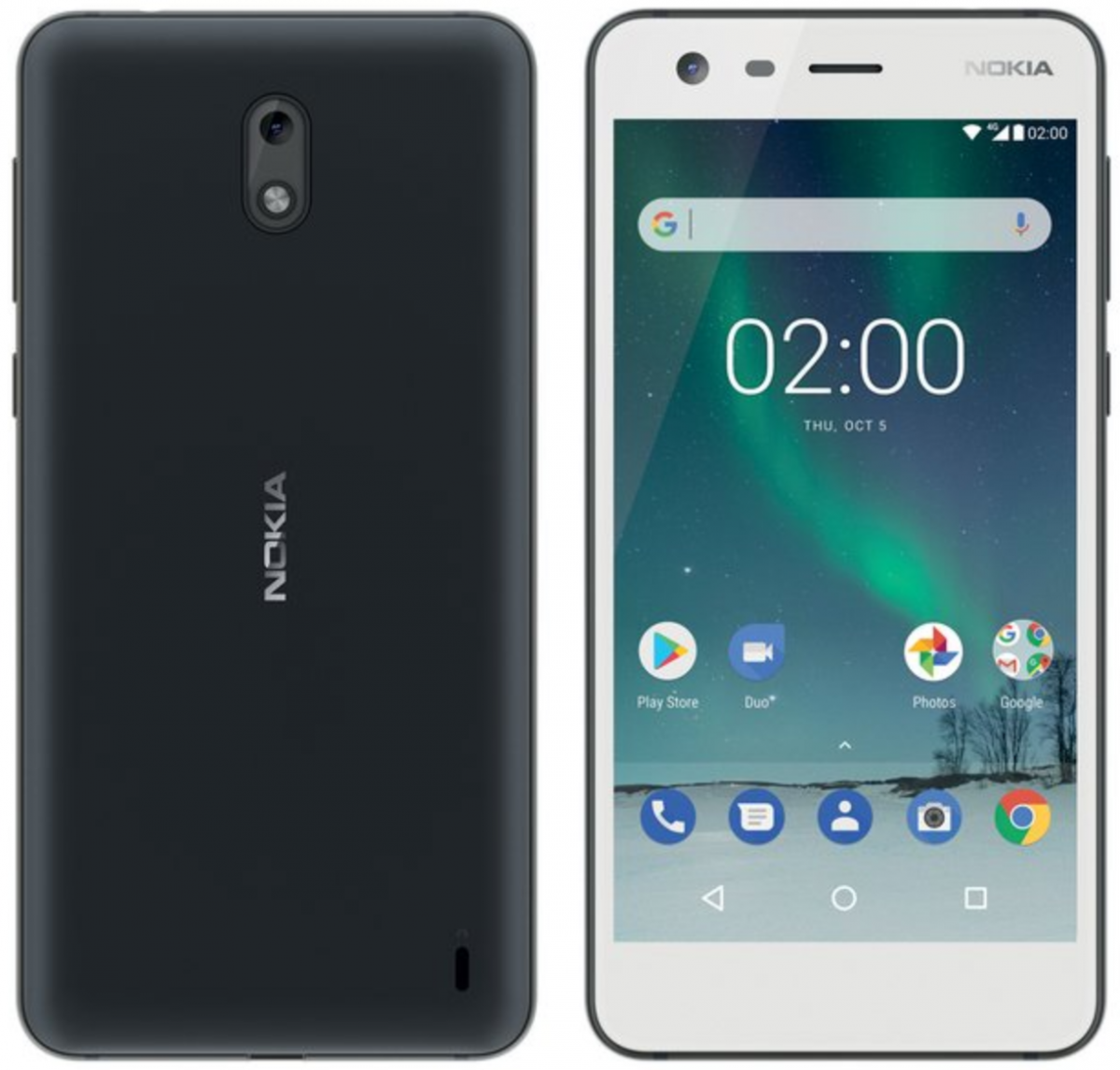Telecom
Nokia 2 with Two-Day Battery Life, Lands in Nigeria

By peter oluka
HMD Global, the home of Nokia phones, has announced the availability of the Nokia 2.
According to the Company, the device’s retail price is N34,500.
With two-day battery life, the Nokia 2 is built to keep going long after other smartphones need recharging. But its impressive battery life doesn’t come at the expense of performance.
Combining a Qualcomm® Snapdragon™ Mobile Platform and a 5-inch, high-quality display with the pure, secure and up to date Android™ experience, the Nokia 2 offers technology that you can depend on, all day every day.
Freedom To Do More
It’s not just about the high-capacity 4100 mAh battery, the 5-inch LTPS LCD HD display offers a bright, crisp viewing experience while delivering lower power consumption.
The Nokia 2 gives you the freedom to fully immerse yourself in continuous entertainment – from HD videos and crisp, clear photos to your favourite songs, social media, and web browsing – without worrying about running out of battery.
With an 8MP rear camera featuring automatic scene detection and auto focus, the Nokia 2 ensures you get fantastic shots every time. And using the 5MP front camera, you can capture the moment from any angle. You will always have the extra capacity you need for the memories you capturewith its dedicated memory card slot and unlimited photo and video uploads to Google Photos.
Built To Last In Every Way
The Nokia 2’s sleek frame is precision-machined from a single block of aluminium, while Corning® Gorilla® Glass is complemented by sculpted polycarbonate on the back. This delivers both a great feel and the build-qualityyou expect from a Nokia smartphone.
Always Pure, Secure And Up-To-Date Android
Nokia smartphones always offer a pure, secure and up-to-date Android experience, with incredible features like Google Assistant but no preinstalls or skins.
Launching with Android Nougat and Android Oreo ready, the Nokia 2 receives monthly security updates so you can be sure that your smartphone is safe and up-to-date.
Joseph Umunakwe, general manager, West, East and Central Africa, HMD Global, said:
“We have created a smartphone people can rely on without subconsciously rationing their battery usage to last the day. Every component of the Nokia 2 – from the display to battery, chipset to system design – has been engineered to draw as little power as possible from the huge battery. This gives fans a long-lasting phone they can rely on. You don’t have to do less with it to preserve longevity, it has been built to give you the freedom to do more.”
Telecom
MTN @ Swish Fusion Summit, Showcases 5G Rollout Strategy

MTN Nigeria Communications Plc has joined other professionals across media, technology, and business gathered in Lagos for the Swish Fusion Tech and Media Summit.

Themed ‘Africa: Big Wins & New Breaks’, the summit drew thousands of attendees and featured more than 40 speakers exploring the intersection of innovation, regulation, and economic growth across the continent.
Among the sessions, MTN Nigeria presented a detailed look at the company’s ongoing 5G deployment efforts and its role in shaping enterprise infrastructure.
Njideka Jack, senior manager for Partnerships in MTN’s Enterprise Business Division, shared details of the investments, reiterating the company’s commitment to delivering high-quality 5G-powered services.
The company’s 5G rollout timeline began in 2022 with license acquisition from the Nigerian Communications Commission. In 2023, MTN moved into pilot testing and infrastructure investment.
By 2024, coverage had expanded to key cities and business hubs.
The company now plans to extend access to more underserved areas throughout 2025 while deepening collaboration with OEMs and regulators.
Beyond the rollout itself, Jack also spoke on the potential of private 5G networks for Nigerian enterprises.
With the ability to offer secure, high-speed, low-latency connectivity, these networks are increasingly being adopted in manufacturing, healthcare, education, and logistics sectors.
The summit’s broader agenda reflected a similar sense of urgency around Africa’s digital future.
Panels and breakout sessions tackled topics ranging from mobile-first product design and regulatory frameworks to the rise of AI in content creation and the realities of funding early-stage tech ventures on the continent.
Speakers from companies like Jumia, Stears and local startups provided perspectives on both the barriers and breakthroughs in building scalable African solutions.
The sessions also sparked conversations about how African businesses are adapting to consumer behaviour shifts and infrastructure limitations.
Telecom
PAT Taps Osi as CEO

Pan African Towers (PAT), a Nigerian infrastructure provider serving 9mobile and Spectranet, has appointed Echezona Osi as chief executive officer.

Echezona Osi
Adefolarin Ogunsanya, company’s, board chairman, explained in a statement that Osi would succeed Oladipo Badru, whose tenure lasted nine months in acting CEO position. Osi has more than 28 years of experience in the telecommunications sector across various regions of Africa.
Prior to his appointment as CEO, he had served as the head of network deployment at Airtel Nigeria, operations director and chief technical information officer at MIC Tanzania, chief technology officer roles at IPT PowerTech Nigeria, Rhino Niger Networks and Biswal Nigeria.
He obtained a degree in electrical/ electronic engineering from the University of Benin and a postgraduate diploma in data science and business analytics from the University of Texas.
Telecom
NCC Introduces N10m Licence Fee for Bulk SMS Service

Companies sending bulk international text messages, also known as Application-to-Person (A2P) messages, will now have apply for a licence that costs N10 million.

This is part of new rules introduced by the Nigerian Communications Commission (NCC) aimed at cleaning up the system, fighting fraud, blocking spam messages and stopping money from leaving the country unchecked.
These A2P messages are the kind customers get from banks, online stores, hospitals and political campaigns, automated texts sent from apps to their phones.
According to the commission, the bulk international text message system has been poorly regulated, allowing misuse and invasion of privacy.
“The International SMS Service Ecosystem in Nigeria has not been fully brought under regulatory control. It has been observed that the excessive use of the Short Message Service has led to fraud, spam and illegal activities,” the NCC said.
The regulator warned that without action, the problem would worsen as more people use mobile phones and digital services.
To solve this, the NCC is creating a central platform, or gateway, through which all international bulk text messages must pass through.
The agency said this would help to monitor messages in real time, ensure proper fees are paid, and make sure the money stays in Nigeria where it can contribute to the economy.
As part of the incoming change, service providers must follow strict rules, including strong data protection, spam filters, and message encryption.
Also, they must also work with local mobile networks and make sure all messages come from a verified sender
The NCC warned that any message without a proper sender ID will be blocked and not delivered to users.
To protect users from unwanted texts, the new rules say companies must get clear permission before sending any promotional content.
The rule also says people must also be able to choose whether they want to receive such messages or not.
Companies are now required to keep records of all messages for at least six months and must clearly state all charges involved.
The NCC said fees for help requests, cancellations, or service info must be transparent and not include hidden charges.
The commission will issue licences to several providers to encourage healthy competition but may limit new licences if needed.
Only companies that show they can stop fraud and safely deliver messages will be allowed to operate. They must also regularly report their message traffic and finances to the NCC.
It warned that any company that breaks the rules risks getting fined, suspended, or having its licence revoked.
Offences like charging illegal tariffs, ignoring security rules, or avoiding taxes will be punished, the NCC said.
The commission added that the new rules follow the Nigerian Data Protection Act 2023 and support the federal government’s goal of strengthening cybersecurity and controlling Nigeria’s digital space.
The framework will also be reviewed from time to time to keep up with new technology and market trends.

 Broadcasting2 days ago
Broadcasting2 days agoNigeria Week Ahead: Inflation, Oil and Naira in focus

 News2 days ago
News2 days agoEFCC: Accusations Against Our Chairman Are Baseless and Misleading

 Telecom1 day ago
Telecom1 day agoMTN Nigeria Targets $1Bn Cloud Market with Largest Modular Data Centre

 Telecom1 day ago
Telecom1 day agoNCC Introduces N10m Licence Fee for Bulk SMS Service

 E-Business1 day ago
E-Business1 day agoFirm Highlights Top Risks of Quantum Computing

 General News1 day ago
General News1 day agoWoodhall Capital and Partners Launch ₦1.5Bn Fund

 General News1 day ago
General News1 day agoBurna Boy Distances Himself from Meme Coin, Labels Crypto as Fraud

 General News1 day ago
General News1 day agoAM Best Reaffirms Stable Outlook for Cyber Insurance Market



















